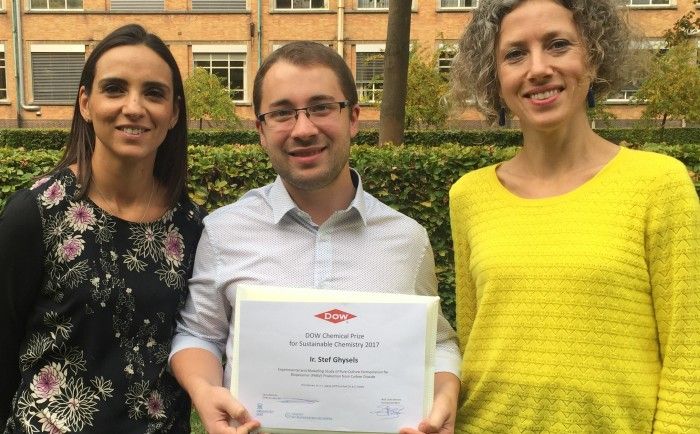Stef Ghysels, PhD researcher at the Ghent University (UGent) received the ‘Dow Chemical Prize for Innovative Solutions’ in reward of his master thesis concerning the production of bioplastics from CO2.
VITO senior researcher Linsey Garcia-Gonzalez and UGent Professor Eveline Volcke promoted the thesis, praised by DOW because it offers innovative solutions and focuses on sustainability at the same time. On top of the prize awarded by DOW, Elsevier’s Bioresource Technology has agreed to publish an article on the thesis.
Stef Ghysel’s thesis looks into the conversion of atmospheric CO2. Both Paris’ climate agreement and the 2030 HORIZON of the European Union point out the importance of CO2 reduction to attain the climate goals. This is, amongst other options, possible by extracting it from the air, a technique called CCU (Capture and Utilisation). With this thesis a production strategy is offered to produce high value bioplastics from CO2.
Producing high quality bioplastics using bacteria and CO2
A lot of research has been done into converting CO2 into bioplastics, using specific bacteria. As not all kinds of bioplastics are of the same good quality, Stef Ghysels has been focusing on the copolymer poly(3-hydroxybutyrate-co-3-hydroxyvalerate), abbreviated PHBV. PHBV is more flexible, more processable, and biodegrades more easily than other tested polymers. Furthermore it is possible to refine these characteristics, depending on specific applications, e.g. packaging, medical implants, prebiotics …
Fermentation is key
To couple the CO2 reduction to the production of the PHBV biopolymer a fermentation process was developed. Cultivated bacteria were fed with CO2, as well as hydrogen gas, oxygen and valeric acid, thereby forming PHBV in a fermentor. This process was optimized to obtain PHBV with a particular composition. For this purpose, a number of experiments were carried out and a mathematical model was developed to better understand the process.
Valuable results
Stef Ghysels concludes that, through the integration of process design and modeling, it is possible to produce a specific bioplastic (PHBV) whose composition and properties can be adapted to specific requirements. Moreover, this is a sustainable CCU technology.
Expert center in CO2 valorisation
For a number of years now, VITO has been building extensive knowledge in valorising CO2 from point sources or the air. VITO focuses on biotechnological processes such as fermentation and (bio)electroconversion. Both have already proven their technical feasibility.Meer informatie
More information
Stef Ghysels, UGent, Stef.Ghysels@UGent.be
Linsey Garcia-Gonzalez, linsey.garcia-gonzalez@vito.be



